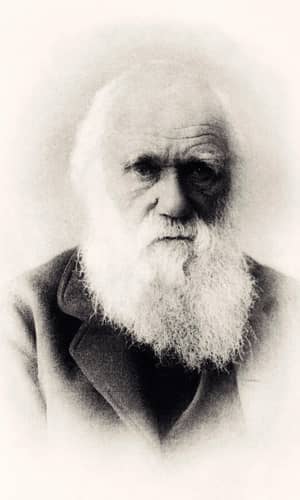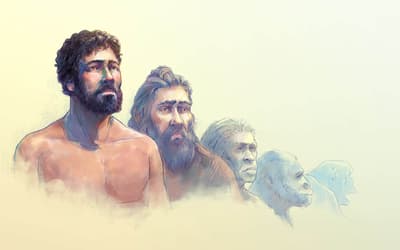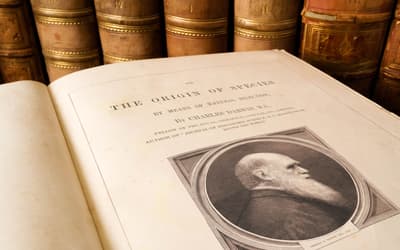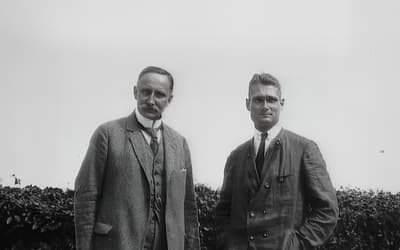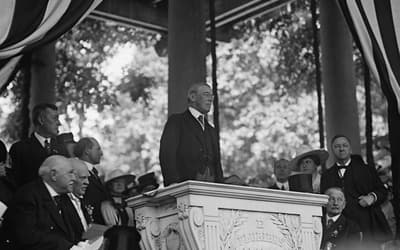The views expressed in this paper are those of the writer(s) and are not necessarily those of the ARJ Editor or Answers in Genesis.
Abstract
Friedrich Engels was in some ways as important as Marx in helping to establish the revolution called Marxism (Communism) that has changed the world. It was Engels who brought Darwinism into Marx’s life and the socialist/communist movement. His role, and the influence of Darwinism, were both important, although Darwinism is a more important part of the radical-left movement today than in the days of Marx. The contribution of both Engels and Marx were intertwined; thus Engels’ work cannot be discussed without covering the contribution of his close co-worker, Karl Marx.
Keywords: Friedrich Engels, Karl Marx, Darwin, Communism, Marxism, Atheism, Christianity, Hitler, Lenin, Virchow, Thomas H. Huxley, Hugo de Vries, Lamarckian, Karl Kautsky, Paul Lafargue
Introduction
It is widely recognized that “No thinker in the nineteenth century has had so direct, deliberate and powerful an influence upon mankind as Karl Marx,” and no other man had more influence on Marx than Friedrich Engels (Berlin 1959, 1). Although historians consider Marx the more important theoretician, the two co-authored most of their work and, as a team, were enormously successful. If each one had lived and worked separately, we may never have heard of either one.
As will be documented, a third person was important to their work, Charles Darwin (Colp 1974, 329). Marx scholar, Paul Heyer, documented in detail his conclusion that “two of the most definitive and influential thinkers of the modern age [were] Marx and Darwin” (Heyer 1982, xi). At least 38 letters Engels and Marx sent or exchanged still exist that mention Darwin (Colp 1974). The first one was dated December 11, 1859, and the last one was written on September 23, 1894. This 35-year period indicate that both Engels and Marx referred to Darwin during much of their adult life. Although the rise of materialism and the war against Christianity dates back to at least the French Revolution, the “post-Darwinian scientific advances have rendered any belief in God irrational and unnecessary” (Horowitz 2018, 7). The claim here is not that without Darwin communism would never have been born, but that the critical factor was secularism, which was rooted in skepticism. And a major pillar of skepticism was the writings of Charles Darwin. In fact,
it is undoubtedly true that skepticism about the existence of God has dominated modern philosophical and scientific thought since the end of the nineteenth century . . . The first [reason for this] is the conviction, an article of faith with many, that the theory of evolution explains the origin and development of life in the universe, and accounts for the appearance of design in nature—fulfilling the role of a ‘Blind Watchmaker’ . . . and thereby dispensing with the need to invoke the idea of God. (Elst 1996, 15–16)
In short, “Darwin made it possible to be an intellectually fulfilled atheist” (Dawkins 1986, 6). Darwinism was, therefore, an important ingredient that supported secularism especially after 1859. And it was secularism that laid the foundation for atheism, and later communism, and allowed it to flourish. Both Marx and Darwin sought to produce a “unified science of mankind” which caused Marx “to seize immediately upon the significance of Darwin’s work” (Heyer 1982, 5). Engels defined Darwinism as
the whole motion of nature is reduced to this incessant process of transformation from one form [of life] into another [and] . . . the proof, which Darwin first developed in connected form that the stock of organic products of nature environing us today, including man, is the result of a long process of evolution from a few originally unicellular germs, and that these have arisen from protoplasm or albumen, which came into existence by chemical means. (Engels 1941, 252)
This is the definition used in this paper. In short, according to the evolutionary mindset, no reason exists to believe in God because natural processes operating on simple chemicals can account for all life-forms, including mankind.
Friedrich Engels Meets Karl Marx
When he lived in Paris, the “most important event . . . for Marx was the visit of Friedrich Engels—the beginning of their life-long friendship . . . . Engels, who was the son of a merchant . . . was himself a merchant, [and thus] had the experience in practical economics that Marx lacked” (Blumenberg 2000, 51). Each man complemented the other, and it is no wonder that they formed a tight bond. Probably the next most important event in Karl Marx’s friendship with Engels was Engels reinforced Marx’s rejection of Christianity and acceptance of materialism. In 1845– 1846 Marx and Engels together wrote a manuscript titled Die Deutsche Ideologie (The German Ideology), that concluded life “had originated in the world in accordance with some kind of spontaneous generation,” consequently negating any need for God (Foster, Clark, and York 2008, 101). In the end, the influence of Engels-Marx in much of the world was so great that they inspired or influenced some of the greatest mass-murderers in history, including Joseph Stalin, Mao Zedong, and Vladimir Lenin.
Materialism and Darwinism
An essential connection exists between materialist atheism and Darwinian. Both creationism and Intelligent Design were strongly opposed by materialists including communists, almost from the beginning of the communist movement (Foster, Clark, and York 2008). Marx and Engels not only accepted materialism, which formed the bedrock of their movement, but “tried to redefine historical materialism in light of Darwinism” (Hunt 2009, 363). When Darwin’s book Origin of Species was published in November 1859, Friedrich Engels was one of the first persons to obtain a copy. As were “so many other Victorians, Engels was fascinated by Charles Darwin’s On the Origin of Species and the theory of evolution by natural selection” (Hunt 2009, 279). Soon after Engels began to read it he wrote to Karl Marx in December 1859, explaining
Darwin, by the way, whom I’m reading just now, is absolutely splendid. There was one aspect of teleology that had yet to be demolished, and that has now been done. Never before has so grandiose an attempt been made to demonstrate historical evolution in Nature, and certainly never to such good effect. (Marx and Engels 1975a, 441)
As Engels correctly realized, what Darwin demolished was the major historical proof for God, the evidence for design in the natural world. Darwin’s primary importance to Engels and Marx was to support materialism. In short, “Darwin came to a heretical conclusion: species were not immutable. All animals were descended from common ancestors, different species resulted from gradual changes over millions of years, and God had nothing to do with it” (Angus 2009, 31).
When Marx read Darwin at Engels’ urging, Weyl used the term “badgering,” instead of urging, Marx soon became an enthusiastic supporter, calling it “the book which, in the field of natural history, provides the basis for our view,” namely materialistic atheism (Marx and Engels 1975b, 232; Weyl 1979, 48). Marx later reread Darwin’s Origin in the fall of 1862, stressing “Darwin’s book is very important and serves me as a basis in natural science for the class struggle” (Colp 1974, 329, 330). As Marx’s son-in-law wrote: “Marx, the most omnivorous of readers, knew the whole of the works of Darwin thoroughly . . . . He read deeply in all sciences; was thoroughly versed in the whole works of Darwin himself” (Aveling 1897, 4). Weikart observed, although “Engels was the junior partner in his intellectual relationship with Marx, he was decidedly superior to Marx in his knowledge of some fields, including natural science. He preceded Marx in reading Darwin’s Origin and perused far more works in evolutionary theory than did Marx” (Weikart 1999, 53). Likely, Engels had a great influence on Marx in the area of science.
Furthermore, “Atheism was not tangential to communism: atheism was based on materialism—a doctrine central, even crucial, to Marxist theory” (Gabel 2005, 490). Engels, in a letter to Marx, added that the book he (Marx) had told him was “absolutely splendid” was very important in their communist movement. Marx wrote to Lassalle on January 16th, 1861, exclaiming that
Darwin’s work is most important and suits my purpose in that it provides a basis in natural science for the historical class struggle . . . Despite all shortcomings, it is here that, for the first time, “teleology” in natural science is not only dealt a mortal blow [to the main evidence for God] but its rational meaning is empirically explained. (Marx 1985c, 246–248)
Of note is, although “Engels lauded Darwin’s theory as one of the greatest scientific accomplishments of the nineteenth century,” he “rejected the validity of Darwin’s theory of natural selection through the struggle for existence as an explanation for human evolution” (Weikart 1999, 53, 71). He preferred theories—such as those of Pierre Trémaux and Lamarck’s theory of the inheritance of acquired characteristics—that did not emphasize the human struggle for existence (Weikart 1999, 72). Nonetheless Engels “paid Darwin the highest compliment by repeatedly comparing him with his colleague Marx” (Weikart 1999, 53).
Marx added in a letter dated December 19th, 1860, explaining “this is the book that contains the natural-history foundation of our view point” of history (Marx 1985a; Weikart 2004, 4). Engels and Marx believed that evolution was a law of nature and, they added, supports the belief that capitalism would eventually evolve into communism. Evolution causes both life and society to progress to higher levels; Marx and Engels believed the end goal of societal evolution was communism. As Paul Heyer explains, one can be a Darwinian in biology, referring only to evolution, and reject Darwin’s method, natural selection. The reason evolution was accepted in spite of rejection of Darwin’s main contribution to evolution, natural selection was because “one cannot proclaim fidelity to the Marxian world view and reject Darwinism [because central to Marxism is the belief that] . . . man emerged from and continues to depend on and transform nature, history as a science will remain incomplete until this foundation is fully comprehended. And no one has contributed more toward this comprehension than Darwin” (Heyer 1982, 27). Furthermore, “there is nothing in Darwin’s theory of evolution antithetical to Marx’s concept of history, and there is much that is complementary, as Marx himself recognized” (Heyer 1982, 27).
Engels and Marx saw Darwinism as indispensable and “consistently advanced evolutionary views against all notions of design by a deity.” As late as 1878, Engels was asked to respond to the anti-evolutionist and anti-Darwinist Rudolf Virchow who believed Darwinism was not only morally dangerous, but a threat to the social order (Kelly 1981, 316–318). Engels (1878, 316–318) wrote in defense of Darwin that the first victims of repression in Germany “after the socialists will be the Darwinists.”
The Need to Eliminate God
After Marx had read The Origin of Species by Charles Darwin, he wrote a letter to fellow German socialist Ferdinand Lassalle in which he exults that God—in the natural sciences at least—had been given “the death blow” (Marx 1985b). The purpose aspect of teleology that Engels concluded had to be demolished was the evidence for God from creation. The “basic premise of all teleological arguments for the existence of God, is that the world exhibits an intelligent purpose based on experience from nature such as its order, unity, coherency, design and complexity” (CUNY 2020). The need to eliminate the Christian God was important because he saw Christianity as impeding the proletariat revolution. This drive was blunted because Christianity taught opposition to violent revolt and that the poor would have their rewards in heaven. Once God was out of the way, it would remove one impediment toward the higher, more evolved, political form of communism. At this time in his life Marx did “not believe that God had created man, but rather man had created God or gods” (Weyl 1979, 64). Marx’s avowed long-term aim, according to his writings, was the destruction of religion (Engels 2020). Socialism, concern for the proletariat and humanism were only pretexts.
Radical socialism was not a new idea, but remained a belief that had little support except in the minds of a few idealistic radicals. This was all changed when “the Socialists had an evolutionary prophet of their own [Karl Marx] who had discredited Manchester [the seat of capitalism and industry in England] as Darwin discredited the Garden of Eden. To him civilization is an organism evolving irresistibly” upward (Shaw 1947, liii). Professor Liedman noted that in Marx’s and Engel’s most important book, Das Kapital, “Darwin alone ruled the roost” and he (Darwin) and his ideas were often mentioned, twice by name (Liedman 2018, 505). Marx wrote in a footnote: “Darwin in his epoch-making work on the origin of species” shows “natural selection [either] preserves or suppresses” organisms which explain their origins (Colp 1974, 331).
Marx’s enthusiasm for Darwin was to the extent that he made “a point of attending the public lectures on evolution given by Darwin’s supporter, Thomas Huxley, and encouraged his political associates to join him” (Angus 2009). Colp concluded Darwin’s work was “epoch-making” for Marx and Engels, meaning that “the Origin—in causing him to alter his view of nature—had impressed him more than most books; perhaps as deeply as any book he read in his maturity” (Colp 1974, 332).
Engels also was good friends with Edward Aveling, the fourth son of a Congregationalist minister. In the early 1880s, Aveling “relaunched himself as ‘the people’s Darwin’ using the public platform . . . to bring a broad, mostly working class audience to atheism and Darwinian thought. He transcribed his lectures into a series of popular, easily understandable penny tracts such as The Student’s Darwin and Darwin Made Easy” (Hunt 2009, 325).
Marx “was so enamored of Darwin’s work that he later sent an edition of Das Kapital to the great evolutionist at Down House.” For his part, Darwin “thought the Germanic notion of a connection ‘between Socialism and Evolution through the natural sciences’ to be, quite simply, ‘a foolish idea’” (Hunt 2009, 280). Darwin was not supportive of communism, but rather capitalism, no-doubt partly because he made a fortune investing in railroad and other stocks.
Nonetheless, Engels and Marx both retained the highest regard of Darwin’s work for the rest of their lives (Angus 2017, 28). When Marx died on March 17, 1883, Engels gave the funeral eulogy, stating: “Just as Darwin discovered the law of development or organic nature, so Marx discovered the law of development of human history . . . . Marx also discovered the special law of motion governing the present-day capitalist mode of production . . . Such was the man of science” (quoted in Hunt 2009, 275).
Marx: From “Christian” to Darwinist
Marx, as a young man, was once a professing Christian. Although his parents descended from a long line of rabbis, Marx’s father and his children were baptized, evidently in order to work in a government position. Although Marx was six years old when baptized into the Protestant Church, he professed to be, and lived his life then, as a Christian (Easton and Guddat 1967, 3). At this time Marx wrote that it was Christianity that made men brethren. In a school examination essay,
Marx referred to the brotherhood of man as being rooted in the union of the faithful with Christ. Developing the parable of the vine and the branches, he concluded that through the love of Christ “we turn our hearts at the same time to our brothers, whom He has bound more closely with us, for whom He also sacrificed himself.” (Easton and Guddat 1967, 3)
Union with Christ, he wrote, gives us “an inner elevation, comfort in sorrow, calm trust, and a heart susceptible to human love, to everything noble and great, not for the sake of ambition or glory, but only for the sake of Christ” (Blumenberg 2000, 11). At about the same time, Marx wrote a paper titled Reflections of a Youth on Choosing an Occupation, in which he opined:
Religion itself teaches us that the Ideal toward which all strive sacrificed Himself for humanity, and who shall dare contradict such claims? If we have chosen the position in which we can accomplish the most for Him, then we can never be crushed by burdens, because they are only sacrifices made for the sake of all. (Wurmbrand 1986, 11)
When Marx completed high school, on his graduation certificate was written: “His knowledge of the Christian faith and morals is fairly clear and well grounded. He knows also to some extent the history of the Christian Church” (Wurmbrand 1986, 11).
His radical shift in thinking occurred after only “two years of university life at Bonn and Berlin . . . [when] Marx became increasingly critical of Christianity” regarding the “the miracles of the New Testament as messianic myths” and “at the end of his university studies, according to one report, he viewed ‘the Christian religion as one of the most immoral of all religions’” He reportedly stated: “Religion is the opium of the people” (Easton and Guddat 1967, 20). Marx was later exposed to materialism at the University of Berlin from 1836 to 1841, and even later, in 1859, to Darwinian ideas. Marx had a strong interest in science for much of his life, so much that Heyer concluded Marx had a “preoccupation with science” (Heyer 1982, 44). It was no surprise that “Charles Lyell’s 1830 book” and other similar works made Marx realize that the so-called “new geology had made creation theory unlikely” (Liedman 2018, 153).
Marx’s criticism of religion, and Christianity in particular, became very explicit in his doctoral dissertation titled “The Difference Between the Democritean and Epicurean Philosophy of Nature” (Easton and Guddat 1967, 5). He explained in his Ph.D. dissertation specifically why he rejected God, namely because he concluded from his university studies that the
proofs for the existence of God are nothing but empty tautologies. For example, the ontological proof merely asserts: “What I conceive for myself as actual (realiter), is an actual conception for me,” . . . . all proofs for the existence of God are proofs for his non-existence; they are refutations of all conceptions of a god. Valid proofs would have to state, on the contrary: “Since nature is imperfect, God exists” (Easton and Guddat 1967, 65–66; italics in original).
The latter argument reminds one of the Darwinian claim that biological examples of supposedly poor design are actually arguments against creationism. Long before embracing Darwinism, he embraced Feuerbach’s materialism, and he consistently rejected all religion in his writings
Although Marx’s materialist conception of the world was solidly established when he was exposed to Darwin, but Darwin’s “theory of evolution filled a gap in Marx’s otherwise solid worldview” (Liedman 2018, 71). Importantly, any doubts Marx may have had about the materialist worldview “came to an end when Darwin’s theories began to become generally accepted” (Liedman 2018, 355). Furthermore, Marx accepted Darwinism because, to Marx, it “had the scientific legitimacy of Newtonian theory coupled to an open-endedness capable of framing the reality of continual change” (Heyer 1982, 47).
Conflict and Struggle Incorporated into Marx’s and Engel’s Bible
The Darwinian idea of progress based on conflict and struggle was incorporated in communism’s most influential book, titled Das Kapital (Hunt 2009, 280). Marx’s famous saying, used by the Soviet Union and its satellites as an official motto that summarized this struggle, was “workers of the world, unite.” The essence of this slogan was that members of the working classes throughout the world should cooperate to defeat capitalism to achieve the socialists’ communist victory.
Although the Marxist idea of class conflict and struggle was incorporated into The Communist Manifesto in 1848 before Marx learned about Darwin’s theory, which was published in 1859, Darwin eloquently reinforced Marx’s philosophy. Furthermore “Marx often referred to history as ‘an evolution,’ both before and after 1859” when Darwin’s book was published (Heyer 1982, 26). Marx was well-read in science long before 1859 and was aware of the pre-Darwin evolutionary theories including the widely read book Vestiges by Robert Chambers (Heyer 1982, 29). Darwin was important because no author before Darwin was as effective as he [Darwin] was in supporting evolution.
Friedrich Engels’ Role in the Darwinian and Communist Revolutions
Friedrich Engels played a critically important role in both the Darwinian and Communist revolutions. It was he who supplied much of the capital to finance Marx’s work. His father, a wealthy industrialist, owned cotton textile factories in Manchester, England, and Barmen, Prussia. In 1845, Engels published the book The Condition of the Working Class in England, based on his observations and research in English cities.
Engels’ financial support enabled Marx to do the library research required to write his books and articles including Das Kapital and the pamphlet by Marx and Engels titled The Communist Manifesto. The 1948 pamphlet ended with the now world-famous phrase: “Let the ruling classes tremble at a Communist revolution. The proletarians have nothing to lose but their chains. They have a world to win. Working men of all countries, unite!” (Marx and Engels 1848).1
Engels’ parents openly opposed their son’s radical political involvement. To divert him from his social revolution activities, they appointed him to run their Manchester, England, factory. While there, Engels met Mary Burns, an attractive, young, radical Irish woman who worked in Engels’ factory. They were together for 20 years, but never married because both were against the institution of marriage, viewing it as a form of class oppression. Monogamous marriage, they believed, allowed men to control women and ensure that their children inherited their property. Mary Burns suddenly died of heart disease in 1863, after which Engels openly lived with her younger sister, Lydia, in London. They rejected the idea that marriage allowed men to control women and married on September 11, 1878.
In the meantime, Engels again began working for his family company, beginning as an office clerk and working his way up to become a partner in the firm, presumably while exploiting his workers (Blumenberg 2000). After working for his father for another five years, Engels retired in 1869, and spent the rest of his life writing and speaking in support of communism. Later in their lives, both Marx and Engels came to believe that, at least in some countries, workers might be able to achieve their revolutionary aims through peaceful means. Engels then argued that he supported gradual social evolution, although still remaining committed to violent social revolution. As Engels wrote:
Nature works dialectically and not metaphysically . . . she does not move in the eternal oneness of a perpetually recurring circle, but goes through a real historical evolution. In this connection, Darwin must be named before all others. He dealt the metaphysical conception of Nature the heaviest blow by his proof that all organic beings, plants, animals, and man himself, are the products of a process of evolution going on through millions of years. (Marx and Engels 1975c, 301)
Other Socialists Led by Darwin
Marx’s social revolutionary ideas were supported by Darwin’s and, more importantly, by Engels’ influence. Furthermore, for this reason Engels was called by Marx scholars Marx’s Bulldog and Marx’s General (Hunt 2009, 275). Engels and Marx were some of the first intellectuals to grasp the significance of Darwin’s evolutionary argument for socialism, but others soon followed, such as the influential German socialist Wilhelm Liebknecht (1826–1900).
Liebknecht, who often visited the Marx family in London, later recalled, “when Darwin drew the conclusions from his research work and brought them to the knowledge of the public, we spoke of nothing else for months but Darwin and the enormous significance of his scientific discoveries” (Angus 2009). Another leading Marx disciple, author and communist Karl Kautsky, wrote that some followers of Marx, called Marxists today, began their journey from theism to materialism with Hegel, but he (Kautsky) “started from Darwin” (Hunt 2009, 264). Kautsky wrote in his autobiography that he first applied himself
to history at the University, but was also enthusiastic over Darwinism. My ideal was the introduction of Darwinism into history. As student I formed a plan . . . to write a Universal History, in which the leading idea should be the struggle for existence of races and classes . . . . The more I occupied myself with the economic history the more had, in my view, the purely Darwinian factor of struggle for existence of races given way to the Marxian of the struggle of classes. (Kautsky 1902, 355)
Ironically, Kautsky, like Engels, did not accept some of Darwin’s explanations for the cause of evolution, but rather preferred Lamarckian theories rather than natural selection. Actually, the cause of evolution was a topic of contention for decades by scientists and laypersons alike after Darwin proposed his theory. Darwin’s contribution was to sell the idea of biological evolution to much of the academic and scientific world. The common belief was Darwin proved evolution true, the mechanism was a detail debated in Darwin’s day and is still debated today (Arthur 1984, 89; Jordan and Kellogg 1908, 49). Not only Kautsky, but also Pierre Trémaux, discussed above, and even Marx, although they all accepted evolution as a fact, all differed in their opinion about the mechanism!
Engel’s and Marx’s Ideas Inspire Scores of Books
Engels and Marx materialist ideas spread to Europe including Germany where it was propagated by numerous scientists including Jena University professor Ernst Haeckel (1834–1919) and many professors in his department. Once Darwinism dominated German academia, Hitler was convinced by the academic establishment to accept a crude form of Darwinian Eugenics. Hitler wrote in a 1923 speech that in all of “nature is a constant struggle between power and weakness, a constant triumph of the strong over the weak” (Weikart 2004, 210). In short, Hitler embraced “an evolutionary ethic that made Darwinian fitness and health . . . the sole arbiter for morality” (Weikart 2004, 210). It was this philosophy that was to dominate Nazi Germany.
Darwin’s influence in the development of communism went well beyond Kautsky, namely to “Bernstein, Alder, Aveling, Plekhanov, Lenin, and the political leadership of the Second International [Marxist Meeting]—whose ideological awakening began with an immersion in the works of Charles Darwin, [and Social Darwinist] Herbert Spencer and the positivist [the view that we cannot know anything about metaphysics, including the existence of God] August Comte—read Marx and Engels from a perspective that already encompassed evolutionary theory” of Darwin (Hunt 2009, 264).
From these writers came scores of books pushing Darwinism, including Ludwig Woltman’s Darwinian Theory and Socialism (1899), and Karl Kautsky’s important book Ethics and Historical Materialism (1906). These books “were just a few of the contributions to a burgeoning communist literature that assumed a link between Darwinism and Marxism” (Hunt 2009, 264). Pannekoek wrote an entire book on the importance of Darwinism to Marxism, and rebutted the arguments of bourgeois Darwinists. Pannekoek’s book was published in German in 1909 and translated into English in 1912 (Pannekoek 1912).
Many writers wrote about species transformationalism (evolution) earlier than Darwin, but it was Darwin who was by far more effective than all those previous to him in communicating the concept, even to the extent of “changing an entire worldview in the process” (Heyer 1982, 40). One of the leading Marx scholars, Sven-Eric Liedman, concluded Darwin was so important to Marxist/ Engels’ theory that his 756-page biography referred to Darwin over 200 times, concluding “Darwin’s theory of natural selection would form the foundation in natural history for their [Marx’s and Engels’] own social theory” (Liedman 2018, 525).
In short, “it is no accident that evolutionary theory provided [Marx] with a model” for his [Marx’s] own theory (Heyer 1982, 51). In the end, “Darwin’s theory of natural selection was . . . important for the Marxist conception of the world” because it “provides a basis in natural science for the historical class struggle” (Liedman 2018, 469, 501).
The Importance of Human-Ape Ancestry in Marxism
Along with Darwinism Comes Racism in Marx and Engels ideology (Weyl 1979). In a letter to Engel’s uncle, Lion Philips, (whose family founded the manufacturing giant Philips Electronics Corporation of Holland), Marx responded to what Orientalist scholar Professor Reinhart Dozy (1820–1883) wrote about the Jews (Philips’ family were Jewish converts to Christianity). Specifically, Philips wrote that, after the Jews’ release “from Babylon, Ezra invented the myth of the creation up to and including Joshua” recorded in our Bible (Marx 1985c, 542; emphasis added).
Marx responded to Philips that “since Darwin demonstrated that we are all descended from apes, there is scarcely any shock whatever that could shake ‘our ancestral pride’” of being Jews (Marx 1985d, 542). If human beings were to die out, Darwin suggested “in his Notebooks, other species—say ‘monkeys’— would evolve to fill the ecological niche left behind by the disappearance of an intelligent hominid” (Foster 2000, 31). One of Marx’s expressions of his aggressive anti-Semitism was his 1844 essay “On the Jewish Question” in which he revealed his beliefs about Jews. Johnson concluded Marx, a man descended from long lines of rabbis on both sides, whose
sinister achievement [was] to marry the economic anti-Semitism of the French socialists to the philosophical anti-Semitism of the German idealists and so to construct a new kind of anti-Semitic conspiracy theory which was to be an intellectual rehearsal for his general theory of capital. (Johnson 1984)
Johnson even concluded that Marx maintained the Jews “had corrupted the Christians, indeed the whole world” (Johnson 1984). Kengor added
Particularly loathsome to Marx was anyone he suspected of part Jewish and African roots. Marx referred to his fellow German socialist Ferdinand Lassalle as a “greasy Jew,” “the little kike,” “water-polack Jew,” “Jew Braun,” “Yid,” “Izzy,” “Wily Ephraim,” “Baron Itzig,” and “the Jewish Nigger.” In a July 1862 letter to Engels, Marx confidently observed of Lassalle, “It is now perfectly clear to me that, as the shape of his head and the growth of his hair indicates, he is descended from the Negroes. (Kengor 2020b)
Professor Kengor writes that Marx’s attitude toward blacks, Jews and even women included
Ugly racial-ethnic stereotypes . . . [which] are littered throughout his writings . . .Consider how Marx spoke of his own son-in-law, Paul Lafargue, husband of his daughter Laura. Paul came from Cuba, born in Santiago, and Marx thus viewed him as marred by “Negro” blood and denigrated him as “Negrillo” or “the Gorilla.” Karl never let up his ridicule of poor Paul. In November 1882, still 14 years after Lafargue and Laura married, Marx complained to Engels that “Lafargue has the blemish customarily found in the negro tribe.” (Kengor 2020b)
Engels also shared Marx’s racists views reflecting evolution:
Engels, a proud Darwinian, averred that Paul possessed “one-eighth or one-twelfth nigger blood.” In 1887, Lafargue had been a political candidate for a council seat in a Paris district that contained a zoo. In an April 1887 letter to Paul’s wife, Engels cruelly opined, “Being in his quality as a nigger, a degree nearer to the rest of the animal kingdom than the rest of us, he is undoubtedly the most appropriate representative of that district.” (Kengor 2020c)
Marx’s personal life reflected his racist views. Four of Marx’s six children preceded Marx in death, and all had tragic ends. The two daughters who survived him later committed suicide (Kengor 2020a, 85). In November 1911, Marx’s son-in-law, the “Negrillo” Paul, died in a suicide pact with Marx’s daughter, Laura. The importance of Marx is revealed by the fact that none other than Vladimir Lenin spoke at Paul and Laura’s funeral (Kengor 2020a, 94). When Marx’s wife, the vivacious Jenny, died her husband did not even attend the funeral (Kengor 2020a, 91). When Karl Marx died, Engels “gave the eulogy, invoking not God but Darwin” (Kengor 2020a, 92).
The Influence of Pierre Trémaux on Engels and Marx
In 1866, Marx “discovered Pierre Trémaux, an ethnologist who claimed to have unveiled the interrelationships between soils, races, and human evolution and to have discovered the key to the rise and fall of civilizations” (Weyl 1979, 131). Marx then, with “unbounded enthusiasm . . . announced his find to Engels. On August 7, 1866, he wrote [to] his “Lieber Fred”: “A very important work which I shall send you . . . Origins and Transformations of Man and other Beings. Paris, 1865. It is . . . a very important advance over Darwin” (Weyl 1979, 131– 132). Tremaux’s theory of the cause of evolution was significantly different than Darwin’s, but the core idea, evolutionism, was the same.
Weyl noted “Trémaux modestly revealed that he had discovered ‘THE GREAT LAW OF THE PERFECTING OF BEINGS.’ Namely ‘THE PERFECTING OF BEINGS IS OR SHOULD BE PROPORTIONATE TO THE DEGREE THAT THE SOIL ON WHICH THEY LIVE IS WORKED” (Weyl 1979, 131–132; emphasis in original). In short, the
beauty, health, intelligence, energy, and civilization level of peoples corresponded directly to the geological age of the land they occupied. Crude, brutish, stupid and lazy peoples and races lived on geologically old terrain. Refined, civilized, handsome, healthy, bright and energetic peoples occupied geologically new land. (Weyl 1979, 132)
Trémaux also concluded that “Neanderthal skulls were ‘strongly reminiscent of the crania of monkeys . . . the backward negro is not an evolved ape, but a degenerate man” (quoted in Weyl 1979, 133). Weyl added that “Marx heartily agreed with this last finding and he considered it further proof of Trémaux’s scientific superiority to Darwin” (Weyl 1979, 133). As noted, Marx—and many other later Marxists—rejected natural selection through the struggle for existence and instead embraced Trémaux’s environmental evolutionary theory.
Many prominent evolutionists rejected natural selection in whole, or in part, include Thomas H. Huxley, Hugo de Vries, and the Neo-Lamarckians (Mayr 2001, 87). In fact, “Natural selection was ‘strongly resisted and . . . not generally accepted until the evolutionary synthesis’” was formulated in the early 20th century (Bowler 1988, 76–104; Mayer 2001, 86). Engels, though, rejected Trémaux’s thesis, correctly noting that “Trémaux’s theories were ridiculous, his ignorance of geology appalling, and his judgments about ethnology absurd” (Weyl 1979, 136).
Engels Influenced Lenin and Mao Zedong
The writings of Engels and Marx also influenced Vladimir Lenin and the communist revolutionaries in Russia. Lenin acknowledged the importance of Engels work to his movement, writing: “After his friend Karl Marx (who died in 1883), Engels was the finest scholar and teacher of the modern proletariat in the whole civilized world” (Lenin 1895, 19). Engels even influenced Mao Zedong, (“Chairman Mao” who led the communist revolution in China), especially through the second and third volumes of Das Kapital, which were translated into Japanese and Chinese (Knight 2005).
Chairman Mao and also Chinese Marxist philosophers wrote in some detail about the subject of Das Kapital, relying heavily on Marx and Engels who, in turn, relied heavily on Darwinian materialism (Starr 1977). Mao saw himself primarily as a Marxist, or at the least as a Marxist-Leninist (Starr 1977). In his masterwork, Marx described On the Origin of Species as an “epoch-making work” (Marx and Engels 1975d, 346). In 1872, Marx sent a copy of Das Kapital to Darwin, inscribing on it “on the part of his sincere admirer, Karl Marx” (Foster 2000, 207). Colp concluded from this that Marx was saluting the new printing of what he regarded as an epoch-making book “and that he had come to minimize some of his doubts about Darwinism” namely Darwin’s support of Thomas Malthus, a man whose ideas Marx aggressively opposed (Colp 1974, 334). Ironically, Darwin’s theory of natural selection was inspired Malthusian population theory.
It was once believed that Marx offered to dedicate some of his writings to Darwin, a capitalist, who politely declined (Weyl 1979, 173). This conclusion was based on a letter dated October 13, 1880, that assumed Darwin declined Marx’s offer. Darwin’s very insightful letter is reproduced in full below:
Dear Sir:
I am much obliged for your kind letter & the Enclosure.—The publication in any form of your remarks on my writings really requires no consent on my part, & it would be ridiculous in me to give consent to what requires none. I shd. prefer the Part or Volume not to be dedicated to me (though I thank you for the intended honour) as this implies to a certain extent my approval of the general publication, about which I know nothing.—
Moreover though I am a strong advocate for free thought on all subjects, yet it appears to me (whether rightly or wrongly) that direct arguments against christianity & theism produce hardly any effect on the public; & freedom of thought is best promoted by the gradual illumination of men’s minds, which follows from the advance of science.
It has, therefore, always been my object to avoid writing on religion, & I have confined myself to science. I may, however, have been unduly biased by the pain which it would give some members of my family, if I aided in any way direct attacks on religion.—
I am sorry to refuse you any request, but I am old & have very little strength, & looking over proof-sheets (as I know by present experience) fatigues me much. I remain Dear Sir, Yours faithfully, Ch. Darwin (Burkhardt 2021).
Because the letter reprinted above was found among Marx’s papers, it was assumed that Darwin was replying to a letter from Marx. Further research has concluded
that the letter in which Darwin declined his correspondent’s request-”I shd. prefer the Part or Volume not to be dedicated to me”—belongs not to Marx’s papers, but to Marx’s “son-in-law,” Edward B. Aveling, whose ardent enthusiasm for Darwin is beyond dispute. (Fay 1978, 134)
At Marx’s funeral in 1883, “Engels opined that Marx and Darwin had already solved the major puzzles [of mankind]” stating that “Just as Darwin discovered the law of development of organic nature, so Marx discovered the law of development of human history” (Pomper 1985, 6). In the end, Darwin and Mark “shared a common, overriding intellectual orientation: they taught us to see human things in historical, developmental terms . . . . [they] were above all, theories of conflict, dynamism and change . . . their abiding concern was always to discover and to explicate the myriad ways in which order grows out of disorder” (Caplan and Jennings 1984, xii). In the end, Darwin had a far greater influence on Marx than Marx had on Darwin.
In a review of the failure of Marxism, some scholars, such as Harvard-trained historian of science Garland Allen, suggested in view of the “very rapid, dissolution of many socialist systems . . . [the] “similarities between Marxist and Darwinian approaches might well be an important means of developing a revitalized Marxist theory of history.” To do this “the Darwin-Marx connection is particularly useful here. Scientific creationists aside, we have embraced Darwinism wholeheartedly while largely rejecting the basic tenets of Marxism” (Allen 1992, 214 in Nitecki and Nitecki 1992).
Summary
As stated by Heyer, “Marx and Darwin were highly influential thinkers whose theoretical contributions have revolutionized our modern age . . . . their major texts, Das Kapital (1867) and The Origin of Species (1859) [are] among the handful of books significantly influencing historical direction” (Heyer 1982, 8). The influence of Darwin on both Marx and Engels has been well-documented, as has also their major influence on the development of communism in both Russia and China.
Their ideas have rapidly spread to the communist countries existing today, including North Korea, Vietnam, Cuba, and Venezuela. Engels was a central partner with Marx in the movement. Without Engels’ input communism might never have flourished as widely as it has today. Darwin’s theory, which was developed in order to, in his words, “murder” God, did
for the understanding of nature what Marx and Engels did for human society—he overturned teleology and essentialism and established a materialist basis for understanding how organisms change over time. And that is precisely what Marx meant when he said that On the Origin of Species “contains the basis in natural history for our view.” (Angus 2017, 40)
As Angus concludes, “Anyone who seriously studies the works of Marx, Engels, and Darwin will understand . . . that Marx was both honest and exceptionally insightful when he wrote that On the Origin of Species ‘contains the basis in natural history for our view’” (Angus 2009, 29). The reason Darwinism is so important to Marxism was explained by the evolutionary biologist Ernst Mayr who wrote “in his scientific works he systematically demolished one after the other of the basic philosophical concepts of his time and replaced them with revolutionary new concepts” (quoted in Angus 2017, 44). Angus opined as a result, “Darwin unwittingly contributed to and strengthened the most revolutionary social theories ever developed, the ideas we know today as Marxism. It is obviously possible . . . to be a Darwinian in biology while rejecting Marxism, but it is not possible to be a consistent Marxist and reject Darwin” (Angus 2017, 44).
Angus adds that the reason it is not possible to be a Marxist and reject Darwin is because underpinning Marxism is the notion that man emerged from nature by the process of evolution, and “science will be incomplete until this foundation is fully comprehended.” Furthermore, he claimed, “no one has contributed more toward this comprehension than Darwin.” In short, the
idea that nature has a history, that species come into existence, change, and disappear through natural processes, is just as revolutionary, and just as important to socialist thought, as the idea that capitalism isn’t eternal, but came into being at a given time and will one day disappear from the earth. (Angus 2017, 45–46)
Finally, it is well-documented that Darwin’s contribution to the communist/Marxist movement was considerable and is one more example of how he changed the world . . . and not for the better. Darwin’s goal to murder God which later opened up the door to communism has been well-documented (Marty 2009). Marxists/Communists have concluded that the “materialists’ victory in science is one of humanities’ greatest achievements” (Angus 2017, 44).
Darwin’s goal of murdering God has been achieved to such a degree that almost 99% of all members of the American Association for the Advancement of Science agree humans evolved from an ape-like common ancestor. Likewise, 97% of U.S. scientists believe that humans have evolved over time (Pew Report 2009). Furthermore, “Scientists overwhelmingly agree that humans evolved over time, and most Americans are aware that this is the case” (Masci 2019).
References
Angus, Ian. 2009. “Marx and Engels . . . and Darwin? The Essential Connection Between Historical Materialism and Natural Selection.” International Socialists Review, no. 65 (2 May). https://isreview.org/issue/65/marx-and-engelsand-darwin.
Angus, Ian. 2017. A Redder Shade of Green: Intersections of Science and Socialism. New York, New York: Monthly Review Press.
Arthur, Wallace. 1984. Mechanisms of Morphological Evolution: A Combined Genetic, Developmental and Ecological Approach. New York, New York: Wiley.
Aveling, Edward. 1897. “Charles Darwin and Karl Marx: A Comparison.” The New Century Review, (March–April): 232 and 321. https://www.marxists.org/archive/aveling/1897/darwin/index.htm.
Berlin, Isaiah. 1959. Karl Marx: His Life and Environment. New York, New York: Oxford University Press.
Blumenberg, Werner. 2000. Karl Marx: An Illustrated History. London, United Kingdom: Verso Books.
Bowler, Peter J. 1988. The Non-Darwinian Revolution: Reinterpreting a Historical Myth. Baltimore, Maryland: Johns Hopkins University Press.
Burkhardt, Frederick. ed. (1880) 2021. The Correspondence of Charles Darwin. Vol. 28. Cambridge, United Kingdom: Cambridge University Press.
Caplan, Arthur, and Bruce Jennings. eds. 1984. Darwin, Marx, and Freud: Their Influence on Moral Theory. New York, New York: Plenum Press.
Colp, Ralph. Jr. 1974. “The Contacts Between Karl Marx and Charles Darwin.” Journal of the History of Ideas 35, no. 2 (April–June): 329–338.
CUNY (the City University of New York). 2020. Chapter 3: Philosophy of Religion—“Proofs for the Existence of God: The Teleological Argument.” https://www.qcc.cuny.edu/socialSciences/ppecorino/INTRO_TEXT/Chapter%203%20Religion/Teleological.htm.
Dawkins, Richard. 1986. The Blind Watchmaker. New York, New York: W. W. Norton & Co.
Easton, Loyd D., and Kurt H. Guddat. eds. and trans. 1967. Karl Marx: Writings of the Young Mark on Philosophy and Society. Indianapolis, Indiana: Hackett Publishing.
Elst, Philip Van der. 1996. C. S. Lewis: A Short Introduction. New York, New York: Continuum.
Engels, Frederick. 1878. Karl Marx and Frederick Engels Collected Works. Vol. 45: Letters 1874–79. Letter to Pyotr Lavrov, dated August 10, 1878. London, United Kingdom: Lawrence & Wishart.
Engels, Frederick. 1941. Ludwig Feuerbach and the Outcome of Classical German Philosophy. New York, New York: International Publishers.
Engels, Frederick. 2020. Socialism: Utopian and Scientific. Paris, France: Foreign Languages Press.
Fay, Margaret A. 1978. “Did Marx Offer to Dedicate Capital to Darwin? A Reassessment of the Evidence.” Journal of the History of Ideas 39, no. 1 (January–March): 133–146.
Foster, John Bellamy. 2000. Marx’s Ecology: Materialism and Nature. New York, New York: Monthly Review Press.
Foster, John Bellamy, Brett Clark, and Richard York. 2008. Critique of Intelligent Design: Materialism versus Creationism from Antiquity to the Present. New York, New York: Monthly Review Press.
Gabel, Paul. 2005. And God Created Lenin: Marxism vs. Religion in Russia, 1917–1929. Amherst, New York: Prometheus Books.
Heyer, Paul. 1982. Nature, Human Nature, and Society: Marx, Darwin, Biology and the Human Sciences. Westport, Connecticut: Greenwood Press.
Horowitz, David. 2018. Dark Agenda: The War to Destroy Christian America. West Palm Beach, Florida: Humanix Books.
Hunt, Tristram. 2009. Marx’s General: The Revolutionary Life of Frederich Engels. New York, New York: Metropolitan Books.
Johnson, Paul. 1984. “Marxism vs. the Jews.” Commentary 77, no. 4 (April): 28–34.
Jordan, David Starr, and Vernon Lyman Kellogg. 1908. Evolution and Animal Life. New York, New York: D. Appleton and Company.
Kautsky, Karl. 1902. “Karl Kautsky. Autobiography.” Social Democrat 6, no. 12 (December): 355–360.
Kelly, Alfred. 1981. Descent of Darwin: The Popularization of Darwinism in Germany, 1860–1914. Chapel Hill, North Carolina: The University of North Carolina Press.
Kengor, Paul 2020a. The Devil and Karl Marx: Communism’s Long March of Death, Deception, and Infiltration. Gastonia, North Carolina: Tan Books.
Kengor, Paul G. 2020b. Marx on Christianity, Judaism, and Evolution/Race. Institute for Faith and Freedom. September 18. https://www.faithandfreedom.com/marx-on-christianity-judaism-and-evolution-race.
Kengor, Paul 2020c “Why Not Cancel Karl Marx? Racism and Anti-Semitism were Second Nature to Him, and Yet the Cancel Culture Gives Him a Free Pass Every Time.” The American Spectator. August 18. https://spectator.org/cancel-karl-marx/.
Knight, Nick. 2005. Marxist Philosophy in China: From Qu Qiubai to Mao Zedong, 1923–1945. New York, New York: Springer Publishing.
Lenin, Vladimir Ilyich. 1895. “Friedrich Engels.” In Lenin Collected Works. Vol. 2, 15–28. https://www.marxists.org/archive/lenin/works/1895/misc/engels-bio.htm.
Liedman, Sven-Eric. 2018. A World to Win: The Life and Works of Karl Marx. Translated by Jeffrey N. Skinner. London, United Kingdom: Verso Publishers.
Marty, Christoph. 2009. Darwin on a Godless Creation: “It’s Like Confessing to a Murder.” Scientific American, February 12. https://www.scientificamerican.com/article/charles-darwin-confessions/.
Marx, Karl. 1835. “Certificate of Maturity for Pupil of the Gymnasium in Trier.” Karl Marx–Frederick Engels: Collected Works.
Marx, Karl. (1860) 1985a. “Letter to Engels, dated December 19, 1860.” In Karl Marx–Frederick Engels: Collected Works. Vol. 41: 1860–1864. Moscow, Russia: Progress Publishers and New York, New York: International Publishers.
Marx, Karl. (1861) 1985b. “Letter from Marx to Ferdinand Lassalle, dated January 16, 1861.” In Karl Marx–Frederick Engels: Collected Works. Vol. 41: 1860–1864. Moscow, Russia: Progress Publishers and New York, New York: International Publishers.
Marx, Karl. (1864) 1985c. “Letter from Marx to Ferdinanrd Laselle, dated June 16, 1864.” In Karl Marx–Frederick Engels: Collected Works. Vol. 41: 1860–1864. Moscow, Russia: Progress Publishers and New York, New York: International Publishers.
Marx, Karl. (1864). 1985d. “Letter from Marx to Lion Philips, dated June 25, 1864.” In Karl Marx–Frederick Engels: Collected Works. Vol. 41: 1860–1864. Moscow, Russia: Progress Publishers and New York, New York: International Publishers.
Marx, Karl, and Friedrich Engels. (1867) 1894. Das Kapital. Kritik der politischen Ökonomie. Dritter Band, zweiter Theil. Buch III: Der Gesammtprocess der kapitalistischen Produktion. Kapitel XXIX bis LII. Herausgegeben von Friedrich Engels. Vol. III, Part 2 (1867–1894). Hamburg, Germany: von Otto Meissner Verlag.
Marx, Karl, and Friedrich Engels. 1848. Manifest der Kommunistischen Partei. London, United Kingdom: Workers’ Educational Association.
Marx, Karl, and Friedrich Engels. 1975a. Marx-Engels Collected Works. Vol. 40. Moscow, Russia: Progress Publishers.
Marx, Karl, and Friedrich Engels. 1975b. Marx-Engels Collected Works. Vol. 41. Moscow, Russia: Progress Publishers.
Marx, Karl, and Friedrich Engels. 1975c. Marx-Engels Collected Works. Vol. 19. Moscow, Russia: Progress Publishers.
Marx, Karl, and Friedrich Engels. 1975d. Marx-Engels Collected Works. Vol. 35. Moscow, Russia: Progress Publishers.
Masci, David. 2019. “For Darwin Day, 6 Facts About the Evolution Debate.” Pew Research Center, February 11. https://www.pewresearch.org/fact-tank/2019/02/11/darwin-day/.
Mayr, Ernst. 2001. What Evolution Is. New York, New York: Basic Books.
Nitecki, Matthew H., and Doris V. Nitecki 1992. History and Evolution. New York, New York: State University of New York Press.
Pannekoek, Anton. 1912. Marxism and Darwinism. Translated by Nathan Weiser. Chicago, Illinois: Charles H. Kerr & Company.
Pew Report. 2009. “Section 5: Evolution, Climate Change and Other Issues.” Pew Research Center, July 9. https://www.pewresearch.org/politics/2009/07/09/section-5-evolution-climate-change-and-other-issues/.
Pomper, Philip. 1985. The Structure of Mind in History: Five Major Figures in Psychohistory. New York, New York: Columbia University Press.
Shaw, George Bernard. 1947. Back to Methuselah. Rev. ed. New York, New York: Oxford University Press.
Starr, John Bryan. 1977. On Mao’s Self-Image as a Marxist Thinker. Modern China 3, no. 4 (October 1): 435–442.
Weikart, Richard. 1999. Socialist Darwinism: Evolution in German Socialist Thought from Marx to Bernstein. San Francisco, California: International Scholars Publications.
Weikart, Richard. 2004. From Darwin to Hitler: Evolutionary Ethics, Eugenics, and Racism in Germany. New York, New York: Palgrave Macmillan.
Weyl, Nathaniel. 1979. Karl Marx: Racist. New Rochelle, New York: Arlington House.
Wurmbrand, Richard. 1986. Marx and Satan. Bartlesville, Oklahoma: Living Sacrifice Book Company.
